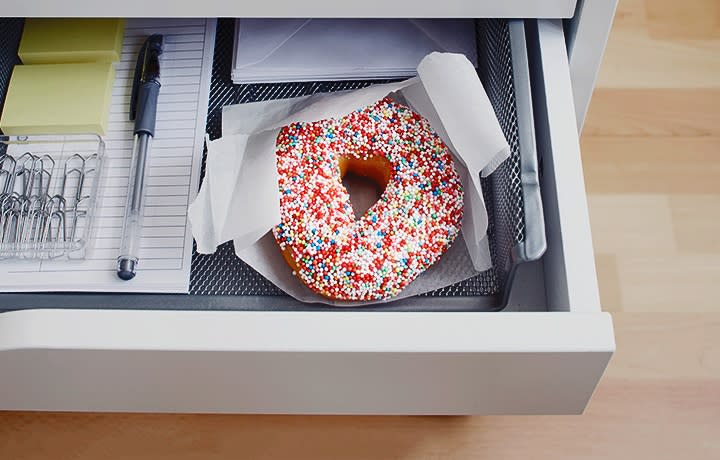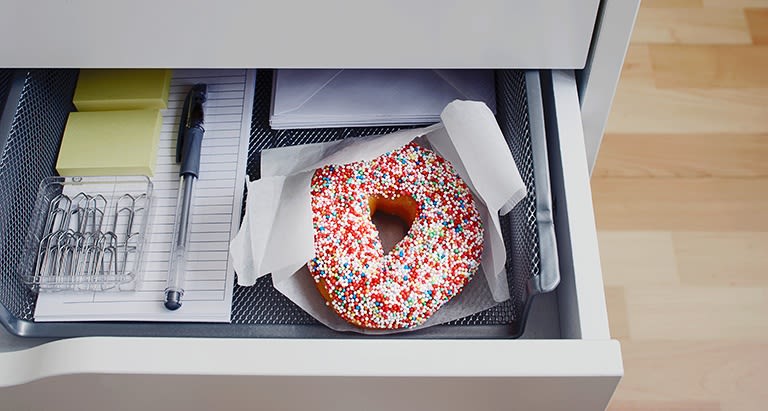Quiz! Are you a sneaky eater?


Do you prefer to eat when no one else can see? If so, your self-esteem may be suffering. Answer the following eight questions to find out if you have secretive eating behaviours and learn what you should do about it.
It’s lunchtime, and your co-workers want to check out a new sushi restaurant. When they ask you to join them, you:
- Say yes. You’ve never met a sushi roll you haven’t liked. [0]
- Are bummed that you can’t make it. You brought your lunch today: a sandwich and salad. [0]
- Politely decline. You don’t like eating in front of other people; when they’re gone, you’ll order sushi takeout. [+1]
There’s leftover chocolate cake in the office kitchen. When you walk past it, you think:
- “Yum! I’ll just take a little piece.” [0]
- “Looks good, but I’m going to pass on cake today.” [0]
- “I can’t eat chocolate cake—it’s bad for me.” [+1]
You’re eating a brownie in your office when a co-worker barges in with a question. What do you do next?
- Silently wonder why no one knocks anymore. [0]
- Ask her if she wants a piece, while secretly hoping she says no. [0]
- Hide the brownie under your notebook. You’ll be embarrassed if she sees you eating it. [+1]
You only meant to have just a few potato chips, but ended up eating the whole bag. How do you feel?
- Totally fine. No one’s perfect, including you. [0]
- A little bummed, but it’s okay. [+1]
- Guilty and ashamed. You can’t believe you finished the entire bag. [+2]
Your go-to snack is trail mix. Where do you store it?
- On the counter, where you can easily reach it. [0]
- In your desk drawer. You tend to get hungry when you’re at work, usually between lunch and dinner. [0]
- A secret hiding place, where no one will walk in on you and see you eating it. [+1]
You polished off the last of the ice cream—about two or three bowlfuls. What do you do with the empty carton?
- Leave it on the table. (You’re the messy one in the relationship!) [0]
- Toss it in the recycling. It happens. [0]
- Bury it under the empty cereal boxes in your trash. You don’t want anyone to know that you finished the pint all by yourself. [+1]
You’re having dinner with your friends, and they’re all ordering salads. You, on the other hand, were eying the list of sandwiches. When the waiter asks for your order, you say:
- “The BLT, please.” It’s one of your favorites—and why should your friends determine what you should or shouldn’t eat? [0]
- “I need another minute to decide.” Is the house salad really that good? [0]
- “I’ll have the salad, too.” If everyone else is doing the “right” thing, why can’t you? [+1]
You ate a big breakfast, and now it’s time for lunch. You decide to:
- Eat your usual meal: grilled chicken, couscous, and zucchini. [0]
- Eat a slightly smaller lunch, but only because you’re a little full from breakfast. [0]
- Skip the meal altogether. You already ate enough calories for breakfast and lunch. [+1]
Are you a sneaky eater?
Add up the points in the brackets [] to find out where your habits fall on the spectrum between healthy eating and sneaky eating.
[0 to 1] Congrats! You don’t feel pressured to hide your eating habits from anyone.
You don’t think of certain foods as “bad” or feel a need to conform to what your friends and family are eating. Instead, you know that you should eat in moderation and that you shouldn’t feel guilty about it.
“Ideally, you would allow yourself to eat all kinds of foods as long as you ground your eating behaviour in good nutrition,” says Eve Freidl, MD, a psychiatrist at Columbia University Clinic for Anxiety and Related Disorders in New York City, who specialises in eating disorders. That means having three regular meals and one to two snacks a day, each of which should contain a mix of protein, carbohydrates, fats, and different vitamins and minerals.
[2 to 4] You have a few “sneaky” eater traits.
You might be internalising some of the messages society sends out—namely, that certain foods are “bad” for you. Problem is, when we take that message to heart, it triggers feelings of guilt or shame that prompt us to eat those foods in private, away from the perceived judgmental eyes of our friends or family members. In fact, this pattern can become a vicious cycle that’s hard to break.
“The idea of having ‘eating rules’ can set you up for problems,” says Dr. Freidl. “When you break your own rule, you don’t feel good about yourself, so you tighten the rule, and make it harder to adhere to. But that just makes you more likely to break the rule later on, and causes you to feel even worse.”
The first step: try not to think in black-and-white terms. Don’t tell yourself that a particular food is “bad”. Instead, think “all foods in moderation”. Then, she says, focus on never going more than 4 hours without eating. “Try not to create a situation in which you’re so restricted that you become overwhelmed with hunger and make food choices that you aren’t comfortable with,” says Dr. Freidl.
RELATED: Am I really hungry?
[5 to 8] You’re prone to secretive eating behaviours.
Whether you set food rules for yourself, prefer to eat alone, can’t help comparing yourself to other people, or think that certain foods are “bad,” it’s clear that some of your eating habits are triggering feelings of guilt or shame.
The first step: try not to think of foods as being either “good” or “bad,” says Dr. Freidl. Instead, think: “Everything in moderation.” Even if you do slip up and eat more than you wanted to, it’s important to move forward. “There’s always the next opportunity to make a healthy choice,” she says.
If you believe that you’re sneaking large quantities of food and feel a loss of emotional control, you may be prone to binge eating. Medication and therapy can help, says Dr. Freidl. Talk to your primary care doctor about which steps to take next. You may want to work with a cognitive behavioral therapist or nutritionist to develop a plan.